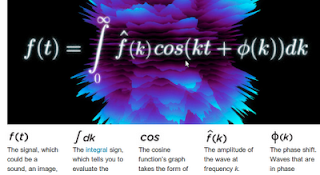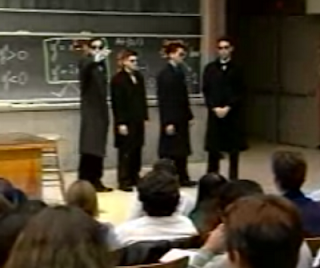Week 24
Physically walking into a bookstore, looking at a magazine stand could translate into the Information Age.
Here is the idea: we could incorporate some "localness" to our existing IT services. We do this simply by utilizing the existing Wifi structure. Wifi already allows connection to a hotspot, and over this, one can serve local HTML pages to any browser w/out any need for larger, outside Internet connectivity. So bookstores have their own hotspots, on which they run their own local apps (with their local server in-house). When a customer is in the bookstore, mags or digital pictures of their covers are displayed in the stand where they usually are. You point your tablet, smartphone, etc. to one of these, take a photo, and the bookstore app that was just served to you which determines the mag, downloads it to your tablet, and you start reading.
All of this happens locally, w/out outisde Internet connectivity, but we are utilizing Internet tech. Time you spent reading could be tallied, and some payment scheme can be worked out between customer and the "bookstore". Tablets could be customer's or ones that belong to the bookstore. When customer steps out, s/he is outside the range of the local Wifi zone. The app stops working.
Why such a system? Paper based solutions are dying, but walking into a store, browsing, looking at things still has value. It's a chance to walk out, walk around, read through some stuff, and maybe even socialize. This action is not currently monetized.
There are lots of opportunities, lifestyle actions like this that are ripe for monetization. Such locality aware apps can be a boon for bookstores, coffeeshops, even supermarkets. Location awareness has already produced some successful apps such as Foursquare. The approach outlined above is even more local, it is in a sense "hyperlocal", with zero central servers.
Here is the new Wii U controller showcased in the gaming event, E3. See that ninja star shape on the tablet? You hold it sideways toward the game, brush your hand on the tablet controller, towards the TV and it throws a ninja star for you inside the game. Very cool.

Good idea. I like it.
Fast Company: "The Obama administration is leading a global effort to deploy “shadow” Internet and mobile phone systems that dissidents can use to undermine repressive governments that seek to silence them by censoring or shutting down telecommunications networks.
The effort includes secretive projects to create independent cellphone networks inside foreign countries, as well as one operation out of a spy novel in a fifth-floor shop on L Street in Washington, where a group of young entrepreneurs who look as if they could be in a garage band are fitting deceptively innocent-looking hardware into a prototype “Internet in a suitcase.”
Financed with a $2 million State Department grant, the suitcase could be secreted across a border and quickly set up to allow wireless communication over a wide area with a link to the global Internet"
"Much of “science” today is not so much scientific as scientistic. That means that the forms and behaviors of science are used, but the underlying logic is missing. Scientism is very much like the phenomenon of cargo cults, in which Pacific islanders built airports and control towers out of wood in order to bring back the planes that came with World War II. They didn’t realize that air traffic control panels actually did something, so they simply built facsimiles out of wood.
We can see scientism in every aspect of published research today. We see it in papers that think that theory is a set of interconnected hypotheses, rather than as the reason why X leads to Y. We see it in work in which each hypothesis is justified by a collection of independent, even mutually contradictory, reasons why the hypothesis must be true. Instead of the hypotheses being tests of an underlying theory, the hypotheses are the principal claims of the theory, and the justifications for these hypothesis can be a smorgasbord of ideas that embody entirely different theories.
Another aspect of scientism is the belief that there are universal best practices in research that are independent of the research question and the research setting. As a result, there is a great deal of argumentation from authority. E.g., we use this measure because so and so did. We even see it used to justify hypothesis: we expect X to lead to Y because so-and-so said it would"
Very nice. Wired talks about the formula used in noise cancelling headphones; this is the kind of thing I'd like to see more in Wired. Programs do stuff, but mathematical statements are about relationships. They dont do, they say what is.

Famous gaffes from Prince Philip. They are all good, but #18 really cracked me up.
"If it has four legs and it is not a chair, if it has got two wings and it flies but is not an aeroplane and if it swims and it is not a submarine, the Cantonese will eat it." Said to a World Wildlife Fund meeting in 1986.
Here is something weird from one Massachussets Institute of Technology lecture. In the middle of a mathematics lecture, four guys dressed up like gangsters a la Reservoir Dogs walk in the classroom, and in unison go "[clap, clap] dont be late", and the dude on the left points to someone and adds "that means you pretty boy". Just weird man... I like pranks, I like movies, and I have no problems with comedy. But this is just an odd display of common thugs.In Western terms, inside that classroom, it is Greece.These fuckers are from Rome.Not cool.

Interesting point: before building his jetpack technology, Glenn Martin spent years studying the mathematics behind flying. He didn't just whoop out some powertool and started cutting shit. That's what you usually see in movies though when inventors are involved in a "I-am-building-something-cool" scene. There might be some kind of "mission music" in the background, dude dances, and goes "yes!". Surely this appeals to an Artisan's "tactile" view of living in the now, to a "do it" inclination, but the real work for such inventions go on silently, in the inventor's head.
Story about Martin Jetpack:
"As a five-year-old boy in the 1960s, I grew up thinking that we’d have holidays on the moon and flying cars and jet packs," [Glenn Martin] says. "But when I turned 21, I was quite disappointed to find that we hadn’t gotten them yet."
Without as much as a second thought, Martin went about changing that.
As a student at the University of Otago in New Zealand, Martin would spend a fair amount of time in the library—especially as a way to stay warm during the winter—and during those prolonged library visits he began to study existing jet pack technology. Unimpressed that then-current examples could fly only for 26 seconds and carry a pilot weighing less than 160 pounds, Martin set out to create a better version. After three and a half years studying the mathematics behind it, Martin [..] built, in his garage, a jet pack that could carry a 220-pound pilot for 30 minutes"
Ryan Tate, Gawker: "If you want Facebook to spend millions of dollars hiring you, it helps to be a talented engineer, as the New York Times today suggests. But it also helps to carouse with Facebook honchos, invite them to your dad's Mediterranean party palace, and get them introduced to your father's venture capital pals, like Sam Lessin did [..]
We'll let you in on a few things the Times left out: Lessin is not an engineer, but a Harvard social studies major and a former Bain consultant. His file-sharing startup drop.io was an also-ran competitor to the much more popular Dropbox, and was funded by a chum from Lessin's very rich childhood. Lessin's wealthy investment banker dad provided Facebook founder Mark Zuckerberg crucial access to venture capitalists in Facebook's early days. And Lessin had made a habit of wining and dining with Facebook executives for years before he finally scored a deal, including at a famous party he threw at his father's vacation home in Cyprus with girlfriend and Wall Street Journal tech reporter Jessica Vascellaro. (Lessin is well connected in media, too.) Facebook platform chief Dave Morin was at that one, and at another exclusive party with Lessin in Cancun, which also featured Facebook co-founder Dustin Moskowitz [..]
We mention all this not to begrudge Lessin his wealth but to use him as an educational case study, and a much fuller one that the Times presented this morning. With the right connections, some face time at the right parties, and perhaps the right father, maybe you too can unload your unprofitable startup, get a sexy new job at Facebook, and even somehow become a national newspaper's poster child for "talent" along the way"
Quora: "For quite a while we've been at a stage of technological evolution where most people don't have to work. The reason we're not living that life of leisure, trying to come up with fun and meaningful things to do, is not technological. We could say that it is economic, but really it is a large scale scam, perpetuated through a symbiotic relationship between big business and big government. This economy is based on keeping most people busy, so they can make money, so they can buy products. Most jobs are busy work. People do what they're expected to do, more or less, but in the bigger picture most of makes no sense. It only makes sense in response to the work of others, doing stuff that doesn't really make sense either. Advertising is big business, needed to get people to buy other stuff than they would if they were well informed. Lawyers get paid well for writing the small print in contracts or on product packaging which nobody reads. Tax accountants earn their living by being very fluent in a labyrinth of rules that change every year. Law makers earn their keep by coming up with more rules, or changing the ones that are there. The actual production is a very small percentage of all of it.
The system will resist its transformation into a more sane and efficient arrangement. Right now, if more of the human work gets done by machines, there will be increased unemployment and a crisis. Then somebody will invent some more busy work, or start a war, or loan out more money, and make it look like everything is buzzing. No, the whole thing would have to be changed, so the economy no longer even pretends to be based on human work and hourly wages. It needs to be based on measuring actual value, and maximizing it for all of us.
Then, what would we do, if we had a different kind of economy and we no longer had to do that kind of work? We'd become free to discover how to really add value. How to do something actually worthwhile. That has never been to be an accountant all your life. The real stuff to do in life is the stuff you're burning for. That won't just be idle entertainment. Most people, if they really, really had a choice, would choose to do something good and constructive, not just for themselves, but for their family, their community and for the world. The things to do would no longer be just mechanical work functions, doing what you're told, showing up for 8 hours per day. No, we're talking about more creative stuff. And, even if there are machines that can do all the heavy lifting, there's still plenty to do, to design things, to make them more enjoyable, more useful, more fun. There's art, there is science, there's certainly no lack of things to do that are worthwhile. There are many problems to solve. We'd be working on those, instead of living fake work lives for the sake of the economy"
#fascinating
In his memoir I Am Spock, Leonard Nimoy writes about his "trek", about how he came to know, and developed Spock -- the famous character on TV show Star Trek OS. He mentions one day he has a Eureka moment, then, he claims he finally "gets" his character. It happens in a scene where Spock is looking at some space anomaly on the viewscreen and in awe of what he is seeing, he mumbles himself: "Fascinating".
At this moment Nimoy says he truly understood the soul of his character. But what was Spock's soul?
First off, he was a scientist. It should be fitting than that a lot of science's essence is captured in this single word. If someone is fascinated with new knowledge, new data, this means that person is able to be fascinated, he is able to say and think "I did not know everything about what I am witnessing, I did not even expect what I am seeing, but here it is... And it is fascinating". Hence the word indicates a person who knows what she does not know. A prerequisite for science.
Second, this word is most likely uttered by someone who appreciates knowledge, almost at an aesthetic level. It is like a painter enjoying a painting, a composer in awe with a brilliant composition. Third, this person goes after, wants, welcomes new knowledge. Also prerequisites for good science.
In 2004, a Taiwanese electronics firm named MediaTek unveiled its latest product--a cell-phone-in-a-box aimed at manufacturers, equipped with everything they needed to make the guts of a working phone on one chipset. Write some software, add features, and snap a plastic case on the front and you've produced a new model. It was an immediate hit with China’s notorious counterfeiters, the shanzhai [..]
The key to the cheap phones was the combination of MediaTek’s chipsets and the vast component bazaars of Shenzhen. While MediaTek’s engineers focused on adding software features such as touchscreen recognition and instant messaging to their chips, shanzhai tricked out basic models with speakers, telescopic photo lenses, and flashlight-strength LEDs. Before long, “Nckias” and “Blockberrys” began appearing across Shenzhen and Shanghai.
With their tiny production runs, shanzhai could manufacture a thousand phones, seed the local markets, see if they caught on, and then crank out some more [..]
Today, the shanzhai market has moved beyond China, and even India [.. L]ast fall, The National--the state-financed newspaper of the United Arab Emirates--warned “some analysts believe China’s bandit phone makers may now be targeting the GCC region,” referring to the Gulf Cooperation Council and its members: the UAE; Qatar; Kuwait, Saudi Arabia, Oman, and Bahrain.
A few months later, half its members were embroiled in the turmoil of the Arab Spring. Although no one has drawn a straight line between the appearance of shanzhai phones in the region and the protests that followed, The National presciently noted at the time that “these cut-price clones are not only saturating markets such as India [..] and are thought to be being targeted at the Middle East region, too, which has large numbers of consumers in cities such as Cairo as well as high-end users in countries such as the UAE.”
And while they’re not equipped to run Facebook or Twitter, the current list of features for MediaTek’s phone includes everything else a budding revolutionary needs to evade or expose government repression, including video cameras, Skype, and Bluetooth--just the thing for sharing government crackdown videos over your State Department-sponsored mesh network--all for as little as $50.
A lot of mathematical modeling is really about being smart about the algebraic statements, their transformations so that we do not have to compute everything.
Let's take calculating the slope of x^2 at point x=5.
We could use the brute force approach, and start coding right away, just do it, we'd come up with a numerical solution like this: We pick a step size for x, and calculate x^2 before and after steps, then get the difference and divide by step size (for the slope).
( ((5+0.01)2) - 52 ) / 0.01
This gives 10.01. Right there however, we have some questions. What is the right step size? Even if we know an approximate good step size, let's count the operations the computer had to use: one addition, two exponentiation, and one division. 4 operations in total.
But Calculus gave us the derivative. The derivative works algebraically. Under the hood, it was formulated using limits, the black art of infinity; and that gave us the algebraic transformation we enjoy today. It was an algebraic shortcut, not a numerical one. And the derivative of x^2 is 2x. Let's calculate it:
2*5 = 10
In total: One operation. That is what using straight algebra gives us. Not only it is more accurate, it saves us computation time. In their modeling efforts modelers jump through many hoops, simplify, transform, hoping that with the right move, that'll make swaths of computational tasks unnecessary, and the result more accurate.
The Fourier Transform shown in the previous Wired article uses that kind of sophisticated algebra-fu. In order to reach that final statement, the inventor used many algebraic tricks such as integration, the knowledge of how cosine and sine behaves under integration so that he could reach that final, clean, concise statement. Some of these moves are ingenious, some are downright devious. G. H. Hardy was right. "[There is no other] subject in which truth plays such odd pranks. [Math] has the most elaborate and the most fascinating technique, and gives unrivalled openings for the display of sheer professional skill".